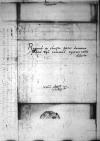⌊Sigismundus⌋ Dei gratia rex ⌊Poloniae⌋, magnus dux ⌊Lituaniae⌋, ⌊Russiae⌋, ⌊Prussiae⌋, ⌊Masoviae⌋ etc. dominus et heres
⌊Georgii Schewke⌋, quem nobis Paternitas Vestra commendat, modo is inter electos ad burgrabiatus functionem fuerit, benignam sumus propter Paternitatem Vestram habituri rationem de promissoque nostro nihil mutamus. Reverendo domino ⌊Samuele episcopo Plocensi, vicecancellario nostro⌋, quamvis ob crebra et gravia negotia, quibus procurandis in aula nostra praeesse solet, perquam aegre carere possumus, tamen nihilominus persuasionibus Paternitatis Vestrae adducti, quae expedire rei publicae {et} ⌊regni nostri⌋ <et> ⌊terrarum nostrarum Prussiae⌋ indicat, ut is ⌊Mariemburgum⌋ eat, carere illo aliquamdiu malumus, quam ut commodis publicis non obsequamur, permisimus itaque, ut istuc iret. Quod rei publicae felix sit et faustum.
Cupimus Paternitatem Vestram bene valere.
Datae
⌊Warscheviae⌋, XXI Aprilis, anno Domini M-o D-o XLIIII-o, regni nostri anno XXXVIII-o.

